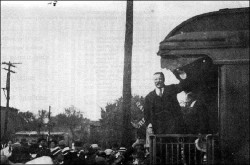
Theodore Roosevelt: Looking northeast on Main street, Osawatomie, from the Missouri Pacific railroad depot. (Source Kansas Historical Society/ Photo courtesy Dike Dickerson.)
(Correction: This speech was delivered on August 31, 1910)
Theodore Roosevelt “New Nationalism Speech” (August 31, 1910)
“There can be no effective control of corporations while their political activity remains. To put an end to it will be neither a short nor an easy task, but it can be done.
We must have complete and effective publicity of corporate affairs, so that the people may know beyond peradventure whether the corporations obey the law and whether their management entitles them to the confidence of the public. It is necessary that laws should be passed to prohibit the use of corporate funds directly or indirectly for political purposes; it is still more necessary that such laws should be thoroughly enforced. Corporate expenditures for political purposes, and especially such expenditures by public service corporations, have supplied one of the principal sources of corruption in our political affairs.”
(Source: “Fifty Core Documents” TeachingAmericanHistory.org
Theodore Roosevelt was the former president when he delivered this speech in Osawatomie, Kansas. The speech was labeled “socialistic,” “communistic,” and “anarchistic,” but was also hailed by progressives throughout the country. In addition to Roosevelt’s sharp attacks on the influence of corporate power on government, he outlined a raft of social reforms including:
•suffrage for women
•an eight-hour-work day
•a securities commission to regulate Wall Street
•a social insurance program (which would eventually become Social Security passed during the administration of Franklin D. Roosevelt)
•primary elections and the direct election of Senators
•a Constitutional amendment that would permit a federal income tax.
Two years later, Roosevelt ran for President as a third-party candidate against the incumbent, William Howard Taft, his hand-picked successor, and Democrat Woodrow Wilson. Taft and Roosevelt split the Republican vote and Wilson won the election.
Osawatomie was most famous as the site of a battle in August 1856 between anti-slavery forces led by John Brown and pro-slavery raiders during the period of a bloody war to determine the future of slavery in the Kansas territory.
President Obama also delivered an address at Osawatomie on December 6, 2011 in which he repeated a call for reform based on some of Theodore Roosevelt’s ideas.
“Now, just as there was in Teddy Roosevelt’s time, there is a certain crowd in Washington who, for the last few decades, have said, let’s respond to this economic challenge with the same old tune. ‘The market will take care of everything,’ they tell us.”
Read more about Roosevelt, his presidency and the election of 1912 in Don’t Know Much About® the American Presidents and Don’t Know Much About® History.